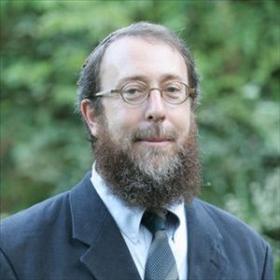Challenging the Chief Rabbinate's monopoly on kosher certification
Private kosher certification: Integrity or Fraud?
A small revolution is under way in Jerusalem - activist Rabbi Aaron Leibowitz has founded a private kosher certification organization called Hashgacha Pratit, and is challenging the Chief Rabbinate's monopoly on kosher certification in Israel.
David Bogomolny 24/11/2014 11:05
Tags: kosher · aaron leibowitz · chief rabbinate · hashgacha pratit · kashrut certification

Rabbi Aaron Leibowitz
While the Israeli Kosher Fraud Law forbids restaurants from advertising themselves as “kosher” without kashrut certification from the Israeli Chief Rabbinate, the legal nuances make all the difference. This matter does not fall under the purview of the religious courts, but rather falls to the civil courts. Legally, it is intended to prevent criminal fraud – to prevent non-kosher restaurants from claiming that they serve kosher food. However, should somebody take legal action against a restaurant that claims to serve kosher food without certification from the Chief Rabbinate, a judge could reasonably rule that the prosecution must prove that the restaurant is truly defrauding its customers by serving non-kosher food. This may be why the Israeli Chief Rabbinate has not taken Jerusalem restaurants Topolino and Carousela to court – because they’re not actually defrauding their customers.
In September 2013, the Reform Movement’s Israel Religious Action Center submitted a petition on behalf of these two Jerusalem restaurants, petitioning the High Court to strike down the Kosher Fraud Law, after each of them dropped their kashrut supervision from the Chief Rabbinate. Shai Gini, owner of the restaurant Topolino, refused to serve leafy vegetables heavily sprayed with pesticides, as mandated by the Rabbinate, and Jonathan Vadei, the owner of Carousela, dropped his certification when asked to pay 600 NIS a month for a kashrut supervisor who did nothing but eat the restaurant’s food during his visits. Both restaurants subsequently opted to join a more transparent and moral kashrut certification organization, which was founded by Rabbi Aaron Leibowitz of Nachlaot. The organization is called Hashgacha Pratit.
In truth, there are many private organizations providing kashrut certification services operating in Jerusalem unsanctioned by the Chief Rabbinate. Interestingly, most of these groups are ultra-Orthodox, and they operate quietly – avoiding attention brought to the legal ramifications of their work. The Hashgacha Pratit organization is very different, as they strive to be agents of meaningful change – striving, as Rabbi Leibowitz says, for nothing less than social revolution. It’s a revolution of trust.
Imagine that each restaurant, venue or food distributor would be free to choose a Kashrut certification appropriate for them, and customers would be free to choose the level of Kashrut that suits them. Rabbi Leibowitz’s independent Hashgacha Pratit is certainly a step in the right direction.
The kashrut certification run by the Chief Rabbinate is faulty on multiple levels. First, the kashrut supervisors receive their salaries from the restaurants, which allows them to potentially blackmail the restaurants for their stamps of approval. Further, supervisors are disincentivized from reporting possible kashrut violations, as they could lose their incomes if the establishments are shut down. The Chief Rabbinate’s monopoly on kashrut certification also creates a more fundamental problem: it eliminates any possibility of accountability by serving as both the provider and regulator for the kashrut certification industry. In Israel, plagued by low employment levels in the ultra-Orthodox sector, “work” in kashrut certification has become nothing more than a means of funding the Torah studies of yeshiva students.
According to Jewish law, one must be considered trustworthy (ne’eman) in order to run a kosher establishment. Therefore, instead of providing restaurants with simple kashrut certificates, the Hashgacha Pratit organization has the restaurants sign a covenant of trust (the brit ne’emanut). The top-down model of Rabbinate kashrut inspectors has been replaced with the Hashgacha Pratit’s trusted kashrut certifier (the ne’eman kashrut), and all restaurant staff are taught the nuances of how to maintain a kosher kitchen – they are included and respected in the covenants of trust. Rabbi Leibowitz challenges us, “The real test of kashrut – is what happens when the inspector turns his back?” The system simply cannot work without trust, and the Hashgacha Pratit puts all of its energy into relationship-building, rather than authority. Like Hiddush, the organization also supports women in religious roles as leaders and professionals, and their primary field worker is Avivit Ravaya – a female, certified kashrut authority.
The Hashgacha Pratit claims to be the most significant voice keeping the conversation of Israel’s Fraud Law alive in the media. Leibowitz is often asked to speak at public forums addressing kashrut, trust and legality, and the organization advises Members of Knesset and works hand-in-hand with other activist groups on legal actions and counseling. While he is enamored with the concept of Rav Kook’s “Kingdom of Israel”, Leibowitz expresses profound disappointment in the rabbinic establishment of today. “We’ve lost the public’s trust,” he sighs, “and the system must be torn down in order to restore that trust – we’ve got no other choice.”
Hiddush envisions an Israel in which the different Kashrut bodies operate side by side, and state intervention is limited to cases of fraud. “Imagine,” says Head of Hiddush Rabbi Uri Regev, “that each restaurant, venue or food distributor would be free to choose a Kashrut certification appropriate for them, and customers would be free to choose the level of Kashrut that suits them. Rabbi Leibowitz’s independent Hashgacha Pratit is certainly a step in the right direction.”